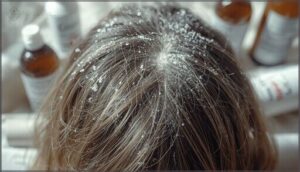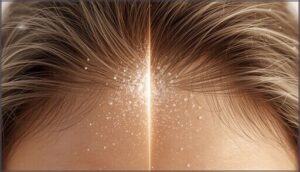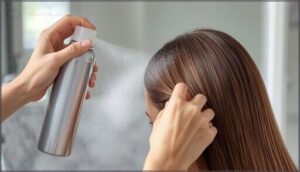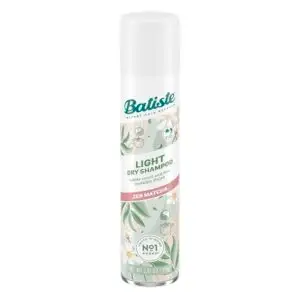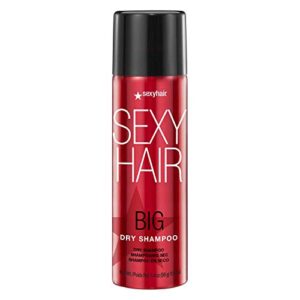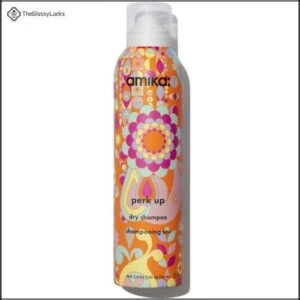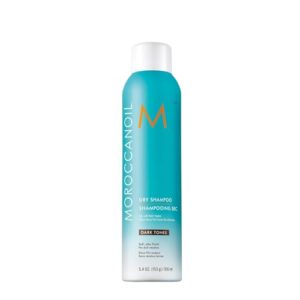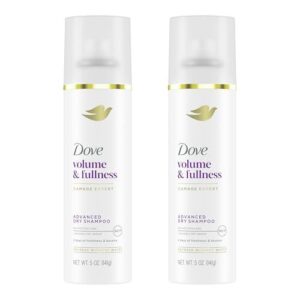This site is supported by our readers. We may earn a commission, at no cost to you, if you purchase through links.

You wake up late, glance at your greasy roots in the mirror, and reach for that can of dry shampoo—again. It’s become your secret weapon for looking presentable when there’s no time (or honestly, no motivation) to wash your hair.
But here’s the thing: while dry shampoo can absolutely save your mornings and stretch out your blowouts, it’s not the free pass your scalp wishes it was. Those absorbent powders do wonders for soaking up oil and adding volume, but they’re also sitting on your scalp, potentially clogging follicles and building up into a problem you can’t just spray away.
The real question isn’t whether dry shampoo works—it does—but whether you’re using it in a way that actually aids your hair health or slowly sabotages it.
Table Of Contents
- Key Takeaways
- What is Dry Shampoo and How It Works
- Benefits of Using Dry Shampoo
- Potential Risks of Dry Shampoo
- Dry Shampoo and Scalp Health
- How to Use Dry Shampoo Safely
- Choosing The Right Dry Shampoo
- Top 5 Dry Shampoos to Try
- Frequently Asked Questions (FAQs)
- Is dry shampoo good for your hair?
- Does taking hot showers dry out hair?
- What makes a good dry shampoo?
- Why do people use dry shampoo?
- Does dry shampoo feel good on the scalp?
- Can you use dry shampoo with regular shampoo?
- Is it better to use dry shampoo or wash your hair?
- Is it safe to use dry shampoo on your hair?
- How often should you use dry shampoo?
- What are the pros and cons of dry shampoo?
- Conclusion
Key Takeaways
- Dry shampoo works by absorbing oil with starch-based powders, but it only masks grease temporarily—it doesn’t actually cleanse your scalp or replace the deep-cleaning action of regular shampooing with water.
- Overusing dry shampoo (more than 2-3 times per week) leads to product buildup that clogs follicles, disrupts your scalp’s natural oil balance, and can trigger irritation, flakiness, or even folliculitis.
- The sweet spot for safe use is applying dry shampoo no more than twice weekly, holding the can 8-12 inches away, and resetting with a proper wash every 2-3 days to prevent scalp damage.
- Choose your formula based on hair type and color—fine hair needs lightweight versions, dark hair requires tinted options to avoid white residue, and sensitive scalps benefit from fragrance-free, hypoallergenic picks.
What is Dry Shampoo and How It Works
If you’ve ever grabbed a can of dry shampoo before rushing out the door, you already know it’s a lifesaver—but do you really know what’s happening on your scalp?
If your scalp feels tight or flaky afterward, you might need to switch to a shampoo designed for dry scalp that actually nourishes instead of just absorbing oil.
This waterless wonder has become a staple in bathrooms everywhere, but understanding how it actually works can help you use it smarter (and avoid some common mistakes).
Let’s break down what dry shampoo is, what’s inside the bottle, and how it stacks up against your regular shampoo routine.
Definition and Primary Purpose
Dry shampoo is your rebellion against daily washing—a waterless hair care product that absorbs oil right at the roots. Instead of water and lather, it uses absorbent powders to refresh your hair texture in minutes, giving you freedom between traditional washes.
Dry shampoo is your rebellion against daily washing—absorbent powders that refresh hair in minutes without water
It targets surface shine and oil buildup on your scalp, creating a clean-looking finish without touching a faucet.
Key Ingredients in Dry Shampoo
So what’s actually inside that canister doing the heavy lifting? The core is absorbent powders—rice starch, cornstarch, or kaolin clay—that soak up oil fast. Carrier agents like silica spread everything evenly across your scalp, while fragrance components mask that powdery smell.
Some formulas add conditioning additives (hello, panthenol) for scalp health, and specialty ingredients help darker hair dodge the dreaded white cast.
For a more detailed look at the key ingredients for oil absorption, check out this expert resource.
How Dry Shampoo Differs From Traditional Shampoo
Here’s where things get interesting—your regular shampoo uses water and surfactants to literally rinse away dirt and oil. Dry shampoo? It just absorbs the grease with starchy powders and sits on your hair shaft.
No deep cleansing action, no follicle flush. It’s a temporary fix that masks oil and odor between real washes—not a replacement for actual scalp interaction with water.
Benefits of Using Dry Shampoo
Here’s the truth: dry shampoo isn’t just some trendy hack—it’s a legitimate tool that can transform your hair routine when you know how to use it right.
From reclaiming hours in your week to actually improving how your hair looks and feels, the benefits go way beyond just masking greasy roots.
Let’s break down exactly what dry shampoo can do for you.
Extending Time Between Washes
You can push your wash interval out by an extra day—sometimes two or three, depending on your scalp’s oil production. Dry shampoo frequency matters here: using it strategically as part of your hair care routine lets you control oil absorption at the roots without stripping moisture.
It’s a smart hair refresh method that keeps your hair hydration balance intact while giving you freedom between washes.
Adding Volume and Texture
Your roots get a serious lift when dry shampoo’s starch particles grip the hair shaft—that’s root lifting in action. These texture enhancers double as volume boosters, giving you body that can boost visible density by 20 to 40 percent.
Oil absorption creates a matte finish that transforms flat, lifeless hair into something with actual movement. It’s styling products meets hair thickening without the blow dryer.
Convenience for Busy Lifestyles
You’re juggling work, gym sessions, and spontaneous plans—dry shampoo becomes your secret weapon. This lifestyle hack delivers a quick refresh in under a minute, no water required. Perfect for busy schedules when traditional hair maintenance isn’t an option.
- Workday touch-ups keep your roots matte and professional between meetings
- Travel-friendly bottles fit TSA rules and hotel-room styling sessions
- Post-workout absorption handles sweat without derailing your day
Time-saving tips don’t get more practical than tossing a can in your bag for hair care on your terms.
Preserving Hair Color and Style
Color preservation gets serious when you’ve invested in salon dye—dry shampoo protects that investment. Sulfate-free formulas absorb oil without stripping pigment, so your vibrant shade stays locked in the cuticle longer.
Tinted versions blend seamlessly with brunettes and darker tones, while clear options suit lighter hair. Between washes, you’re maintaining both color and texture without the fade that frequent shampooing triggers.
For more details on the importance of using sulfate-free products to maintain hair colour, explore expert-backed routines outside your regular shampooing.
Potential Risks of Dry Shampoo
Look, dry shampoo is a lifesaver—but it’s not without its downsides. Overdo it or use it the wrong way, and you could end up dealing with some pretty annoying (and avoidable) problems.
Here’s what can go wrong when dry shampoo becomes your hair’s new best friend.
Scalp Buildup and Irritation
When dry shampoo overstays its welcome, your scalp health and conditions pay the price—excess product residue clogs hair follicles and throws off your oil balance, inviting scalp irritation and microbial imbalance. Watch for these red flags:
- Itchy scalp remedies aren’t cutting it anymore
- White flakes along your part
- Tender, red patches
- Greasy buildup despite daily sprays
- Folliculitis bumps near your hairline
Scalp problems demand better scalp care—not another layer of powder.
Risk of Dryness and Breakage
Think of your hair strands like rubber bands—when they lose moisture, they snap under tension. Dry shampoo can leave mineral oil and starch residues that rob your hair of hydration, leading to split ends and brittle hair that breaks when you comb it.
This moisture loss shifts your scalp’s natural balance, weakening strands and increasing hair damage over time. Your dry scalp doesn’t help matters either.
Chemical Exposure and Safety Concerns
You’re not just spraying powder—you’re inhaling volatile solvents and propellants that drift into your airways. Aerosol risks include benzene contamination (rare but monitored), plus fragrance compounds that trigger skin irritation in sensitive scalps.
Some formulas contain aluminum that dries you out, while talc raises cancer risk questions. Chemical exposure adds up fast, especially in poorly ventilated bathrooms.
Cosmetic safety matters—choose sulfate-free, fragrance-free options when possible.
Dry Shampoo and Scalp Health
Your scalp isn’t just the foundation for great hair—it’s living skin that needs attention and care. When dry shampoo sits on your scalp too long or gets used too often, it can mess with the delicate balance your follicles need to thrive.
Here’s what you need to watch for to keep your scalp healthy while still enjoying the convenience of waterless washing.
Impact on Follicle Health
Your follicles need room to breathe—but dry shampoo residue can compromise that fast. Here’s what overuse does to those essential hair roots:
- Follicle clogging from powder buildup traps oil and debris, creating a congested scalp environment
- Scalp irritation emerges when fragrances and particles settle near follicle openings
- Folliculitis (inflamed follicles) can develop if bacteria thrive in product-laden conditions
- Hair loss and breakage may follow when clogged follicles disrupt your natural growth cycle
Signs of Scalp Issues From Overuse
Your scalp will send clear signals when you’ve crossed the line with dry shampoo. Scalp irritation often shows up first—redness around your hairline or crown that feels tender to touch. If you notice an itchy scalp that won’t quit, white flakes dusting your shoulders, or small inflamed bumps (hello, follicle damage), it’s time to reassess your routine.
| Warning Sign | What It Means |
|---|---|
| Persistent itch and burning | Sensitive scalp reacting to buildup |
| Visible white residue | Product accumulation blocking pores |
| Red bumps or inflammation | Possible folliculitis from clogged follicles |
| Increased hair loss when brushing | Weakened strands from dryness symptoms |
These scalp conditions can escalate if ignored—some users even develop seborrheic dermatitis from prolonged overuse. Pay attention, and you’ll catch problems before they require itch relief treatments or medical intervention.
Preventing Dandruff and Flakiness
You can actually prevent dandruff and flakiness by pairing dry shampoo with regular scalp exfoliation—that means a gentle scrub once a week to lift dead cells before they pile up.
Since malassezia (a fungus linked to seborrheic dermatitis and dandruff causes) thrives on oily buildup, keep your hair follicle environment balanced.
If you’ve got a sensitive scalp or persistent itchy scalp, swap in a medicated formula between washes for real flake prevention.
How to Use Dry Shampoo Safely
Here’s the thing—dry shampoo only works in your favor when you actually use it the right way. Most people spray and pray, which is exactly how you end up with clogged follicles and a scalp that’s staging a full-on revolt.
Let’s break down the smart approach to keeping your hair fresh without wrecking your scalp health in the process.
Frequency and Best Practices
Your hair doesn’t need dry shampoo every day—that’s a fast track to product buildup and unhappy follicles. Stick to 2 to 3 days per week for most hair types, and schedule a full wash every 5 to 7 days.
These refresh intervals keep your scalp breathing while you enjoy the dry shampoo benefits without the risks.
Proper Application Techniques
Here’s the truth: spray techniques matter more than the product itself. Hold the can 8 to 12 inches from your scalp and aim for root coverage in short bursts—this prevents product buildup.
- Section your hair into 4 to 6 parts for precise targeting
- Lift small sections with your fingers to expose the scalp
- Massage the powder in using circular motions at the roots
- Wait 1 to 2 minutes before brushing through gently
Complementing With Regular Washing
Think of dry shampoo as your between-washes ally—not your only move. Washing frequency matters: aim for a proper cleanse every 2 to 3 days to maintain hair balance and scalp health. Regular shampooing removes product buildup that shampoo alternatives can’t touch, supporting hair restoration and overall hair health.
| Routine | Scalp Impact |
|---|---|
| Dry shampoo daily | Residue blocks follicles, risks irritation |
| Wash every 2-3 days | Ideal product removal, maintains pH balance |
| Alternate both methods | Best hair revival with minimal stress |
Choosing The Right Dry Shampoo
Not all dry shampoos are created equal—and the wrong one can leave you with a chalky mess or an irritated scalp. Your hair type, color, and scalp sensitivity all play a role in finding your perfect match.
Let’s break down what to look for so you can grab the right bottle with confidence.
Matching Dry Shampoo to Hair Type
Your hair texture isn’t just a detail—it’s the roadmap to finding your perfect dry shampoo. Fine hair craves lightweight formulas that absorb oily roots without turning limp, while thick strands can handle richer versions that tackle scalp buildup.
Curly hair needs texture-friendly options that won’t spark frizz, and straight hair? Target those roots where oil shows first for maximum refresh.
Options for Sensitive Scalps and Dark Hair
Sensitive scalps need gentle formulas that won’t trigger itchiness or redness—fragrance-free and hypoallergenic options are your best allies here.
Dark hair deserves tinted versions that blend instead of leaving chalky streaks (because who wants to look like they aged overnight?).
Look for alcohol-free picks that absorb oil without drying out your roots, and always patch-test before committing fully to any new dry shampoo.
DIY Vs. Commercial Dry Shampoos
You can whip up homemade recipes with natural ingredients like cornstarch or cocoa powder—they work for about six hours but need serious brushing to avoid white residue.
Commercial spray formulas with silica keep oil at bay longer (up to eight hours) and vanish faster, though they pack more chemical alternatives.
DIY beauty saves money; store-bought saves time.
Top 5 Dry Shampoos to Try
Ready to break free from the daily wash routine? I’ve rounded up five dry shampoos that actually deliver on their promises—from budget-friendly classics to luxe formulas that work magic on different hair types.
Whether you’re dealing with an oily scalp, dark hair that shows white residue, or you just want something that smells fantastic, there’s a winner here for you.
1. Batiste Dry Shampoo For Hair
If your hair needs a quick rescue between washes, Batiste’s Light Zen Matcha version delivers without the heavy residue. This 3.81 oz can uses rice starch to soak up oil at your roots while leaving behind a lightweight, matte finish—no chalky buildup or weighed-down strands.
The green tea and chamomile scent feels invigorating without screaming ‘I skipped wash day.’ It works beautifully on normal to dry hair and sensitive scalps, though those with seriously oily roots might need something stronger.
For most folks, it’s a solid go-to.
| Best For | People with normal to dry hair who want a lightweight refresh between washes without any chalky residue or heavy feeling. |
|---|---|
| Form | Spray |
| Size | 3.81 oz |
| Hair Type | Normal to dry |
| Absorbs Oil | Yes |
| Adds Volume | Yes |
| No Wash Required | Yes |
| Additional Features |
|
- Invisible matte finish that actually disappears into your hair
- Light, pleasant scent with green tea and chamomile notes that isn’t overpowering
- Works well on sensitive scalps without irritation
- Not strong enough for very oily hair or scalps
- May leave slight residue on darker hair colors
- Won’t replace regular washing—just buys you an extra day or two
2. SexyHair Dry Shampoo Spray
Big Sexy Hair Dry Shampoo targets volume seekers—those second-day roots that need a lift and an oil reset. The transparent spray absorbs grease fast (we’re talking two minutes) without leaving that telltale white cast on darker strands.
At $20.99 for 3.4 oz, it’s pricier than drugstore options, but the matte finish and volumizing boost make it worthwhile if your hair is prone to fall flat. Just don’t lean on it too heavily—overuse can dry things out, so pair it with a solid conditioner between washes.
| Best For | People with fine to medium hair who want serious volume and oil control between washes, especially if you’ve got darker hair that shows white residue from other dry shampoos. |
|---|---|
| Form | Spray |
| Size | 3.4 oz |
| Hair Type | Fine to coarse |
| Absorbs Oil | Yes |
| Adds Volume | Yes |
| No Wash Required | Yes |
| Additional Features |
|
- Absorbs oil quickly without leaving any visible powder or white cast on dark hair
- Gives real volume that actually lasts up to 72 hours, not just a temporary puff
- Works across different hair textures—fine, medium, and coarse all get results
- At $20.99 for 3.4 oz, it’s noticeably more expensive than most drugstore dry shampoos
- Can dry your hair out if you use it too often without balancing it with a good conditioner
- May not cut it if you have super oily hair—it works best for moderate oil control
3. Amika Dry Shampoo Spray
Amika’s Perk Up brings a different vibe—$29 for 5.3 oz, but you get rice starch that genuinely won’t ghost your darker hair with residue. The ultra-fine mist means you can layer it without buildup, and it cools your scalp (hello, post-gym refresh).
It’s vegan, talc-free, and sea buckthorn berry keeps things nourished while you absorb oil.
The catch? Some users battle sticky spray nozzles, and if you’ve got super-fine strands, you’ll need to massage thoroughly or risk patchy coverage.
| Best For | People with oily hair who want a no-residue dry shampoo that adds volume and works for daily refreshes between washes. |
|---|---|
| Form | Spray |
| Size | 5.3 oz |
| Hair Type | Oily |
| Absorbs Oil | Yes |
| Adds Volume | Yes |
| No Wash Required | Yes |
| Additional Features |
|
- Invisible formula with rice starch that doesn’t leave white residue, especially great for darker hair
- Ultra-fine mist allows layerable application without buildup, plus it cools and refreshes the scalp
- Vegan and free from talc, sulfates, parabens, and phthalates
- Higher price point at $29 for 5.3 oz compared to other dry shampoos
- Spray nozzle can get stuck or malfunction according to some user reports
- May require extra massaging for fine hair types to avoid patchy coverage
4. Moroccanoil Dry Shampoo For Dark Hair
Moroccanoil’s dark-hair formula ($26 for 6.97 oz) uses ultra-fine rice starch and argan oil—so you get oil absorption plus nourishment, not just chalky roots. It removes up to 85% of surface oil and actually blends with brunette and black tones, though some folks still spot white powder if they overspray.
UV protection is a bonus for color-treated hair, and that signature Moroccanoil scent lingers nicely. Just shake well, spray 6–8 inches from your scalp, and massage—you’ll dodge residue and keep your natural shine intact.
| Best For | Brunettes and those with dark hair who want to refresh their roots between washes without leaving white residue behind. |
|---|---|
| Form | Spray |
| Size | 6.97 oz |
| Hair Type | Normal |
| Absorbs Oil | Yes |
| Adds Volume | Yes |
| No Wash Required | Yes |
| Additional Features |
|
- Removes up to 85% of surface oil while nourishing hair with argan oil instead of just drying it out
- Includes UV protection to help preserve color vibrancy on treated hair
- Signature Moroccanoil scent leaves hair smelling fresh without that typical dry shampoo smell
- Some users still notice white powder or residue if they spray too much or don’t massage it in well
- Pricier than most drugstore dry shampoos at $26 for 6.97 oz
- Strong chemical smell during application, even though the final scent is pleasant
5. Dove Dry Shampoo Spray
Looking for a budget-friendly option? Dove’s Volume & Fullness spray ($15.88 for two 5-oz cans) uses cassava starch to soak up oil and lift flat roots fast. It won’t weigh your hair down, and that light, clean scent is a nice touch—not overpowering.
Spray from 6 inches away, massage it in, then brush through to avoid white residue on darker hair. Just don’t go more than two days between real washes, or you’ll risk buildup on your scalp.
| Best For | People with oily hair who want a quick, affordable refresh between washes and need extra volume at the roots. |
|---|---|
| Form | Spray |
| Size | 5 oz |
| Hair Type | Oily |
| Absorbs Oil | Yes |
| Adds Volume | Yes |
| No Wash Required | Yes |
| Additional Features |
|
- Budget-friendly at $15.88 for two cans
- Adds noticeable volume and fullness without weighing hair down
- Light, clean scent that isn’t overpowering
- Can leave white residue on dark hair if not brushed through properly
- Causes buildup if used more than two days in a row without washing
- Volume may not hold all day for everyone
Frequently Asked Questions (FAQs)
Is dry shampoo good for your hair?
Dry shampoo is basically a lifesaver—until it isn’t. Used right, it absorbs oil and adds volume between washes.
But overdo it, and you’re looking at buildup, clogged follicles, and irritation.
Does taking hot showers dry out hair?
Yes—hot showers strip your scalp’s natural oils and lift the hair cuticle, making strands drier, rougher, and more prone to breakage. Finish with a cool rinse to seal moisture in.
What makes a good dry shampoo?
You want a formula that absorbs oil without leaving visible residue or weighing hair down. Strong absorbents like rice starch work best—plus ingredients that match your natural color and won’t irritate your scalp.
Why do people use dry shampoo?
Right when your alarm doesn’t go off and you’re racing out the door, dry shampoo swoops in to soak up root grease, add quick lift, and buy you another day before washing.
Does dry shampoo feel good on the scalp?
It depends on your scalp. Some people love the light, powdery feel and instant oil absorption. But others find it gritty, irritating, or uncomfortably dry—especially with fragrance-heavy formulas.
Can you use dry shampoo with regular shampoo?
Think of dry shampoo as your between-washes refresh—not a shampoo replacement. You’ll still need regular shampoo to actually cleanse your scalp and remove buildup. Use both, just not simultaneously.
Is it better to use dry shampoo or wash your hair?
Neither replaces the other—they work best as a team. Use dry shampoo for quick oil control between wash days, but regular shampoo is essential for actually cleansing your scalp and removing buildup.
Is it safe to use dry shampoo on your hair?
Dry shampoo is safe when you use it occasionally—not as your daily go-to. The key is balancing it with regular wet washing so buildup doesn’t clog your follicles or irritate your scalp.
How often should you use dry shampoo?
You can safely reach for dry shampoo two times weekly, maybe three if your scalp runs exceptionally oily—but always reset with a proper water-and-shampoo cleanse before repeating the cycle.
What are the pros and cons of dry shampoo?
You get major perks—less washing, more volume, and time saved on hectic mornings.
But overdo it and you’re risking buildup, clogged follicles, and irritation that can mess with your scalp’s natural balance.
Conclusion
Dry shampoo is like a Band-Aid for your hair—useful in a pinch, but not a replacement for actual healing. So, are dry shampoos good for hair? They’re excellent time-savers when used smartly, but overdo it and you’re trading convenience for scalp health.
Keep it to two days max between washes, apply it right, and don’t let buildup sabotage your follicles. Your hair deserves both the shortcut and the real deal.
- https://www.instagram.com/claytonhawkins/?hl=en
- https://ulta.ztk5.net/c/221109/164999/3037?subId1=marieclaireus-us-1415340135769763545&sharedId=marieclaireus-us&u=https%3A%2F%2Fwww.ulta.com%2Fp%2Fwicked-style-reviving-dry-shampoo-pimprod2054297%3Fsku%3D2643777
- https://www.ncbi.nlm.nih.gov/pubmed/16832574
- https://www.mayoclinic.org/diseases-conditions/dandruff/symptoms-causes/syc-20353850
- https://www.cancer.org/cancer/cancer-causes/talcum-powder-and-cancer.html


